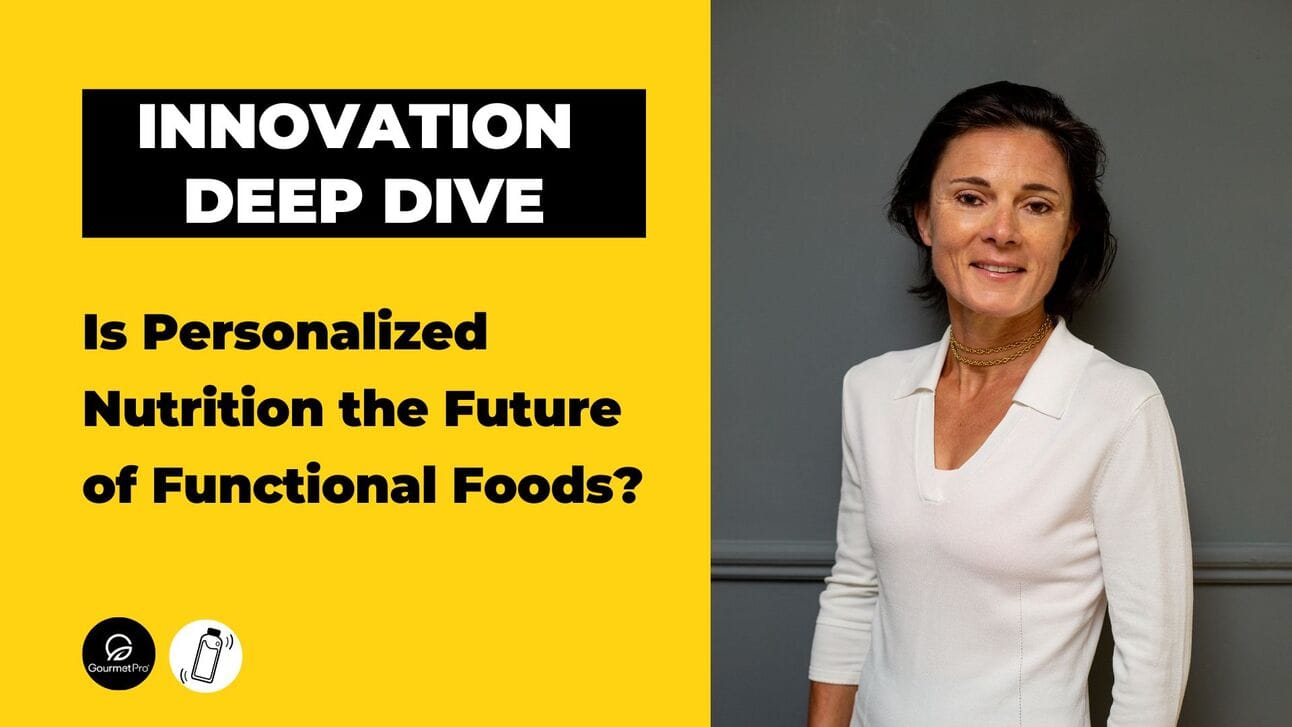
Hey there, Market Shakers!
For the next few weeks, we’ll be diving into the wonderful world of innovation within the food and beverage industry and exploring various facets with the help of our awesome experts. Our very first in this series is linked to health and wellness.
People have become super aware of how crucial diet is for their long-term wellbeing. They’re always on the lookout for ways to stay healthy without sacrificing their favorite aspects of food – taste and convenience. This has given rise to a global boom in functional foods and beverages, which by the way is cozying up to another cool trend: personalization. 🌿🍹
So, I sat down with GourmetPro expert and founder of inewtrition, Raphaëlle O’Connor, to get the lowdown on functional foods and personalized nutrition. Raphaëlle is highly experienced in new product development and innovation for the food industry. Her areas of expertise span functional beverages, dietary supplements, nutraceuticals, and personalized nutrition.
Today:
📰 In The News: Dynamic pricing for groceries, Alt-Palm Oil, and crunchy condiments
📱Trending with Gen Z: Better-for-you mooncakes
🚀 Innovation Deep Dive: Raphaëlle O’Connor, GourmetPro expert & founder of inewtrition, takes us through the nitty-gritty of creating products for functional foods and personalized nutrition.
📰 In The News
A curation of our favorite F&B innovation stories from the week. Can be read in less than a 🧻 break.
The hunt for solutions to cut down food waste continues at a breakneck pace. Dynamic pricing could be a gamechanger for supermarkets, this study suggests. Are you gonna eat that? 🏷️🛒
Scientists have created an alternative to palm oil, appropriately named Alt-Palm Oil, from a by-product from the linseed industry, natural fiber, and rapeseed oil. They say it is better for the environment and health than the OG. 💧🌱
Our love affair with texture refuses to fade away, just like our love affair with heat. So why not make the best of both worlds and spice things up with the slew of crunchy chili condiment launches? Also, Crunchy would probably make a great addition to the Spice Girls…🌶️
Sweet dreaming
Halloween - the only time considered appropriate for kids to take candy from strangers - is just around the corner. Check out which are the most popular Halloween treats by state in the US in this rather cool map put together by Candystore.com.🌱🎃👻
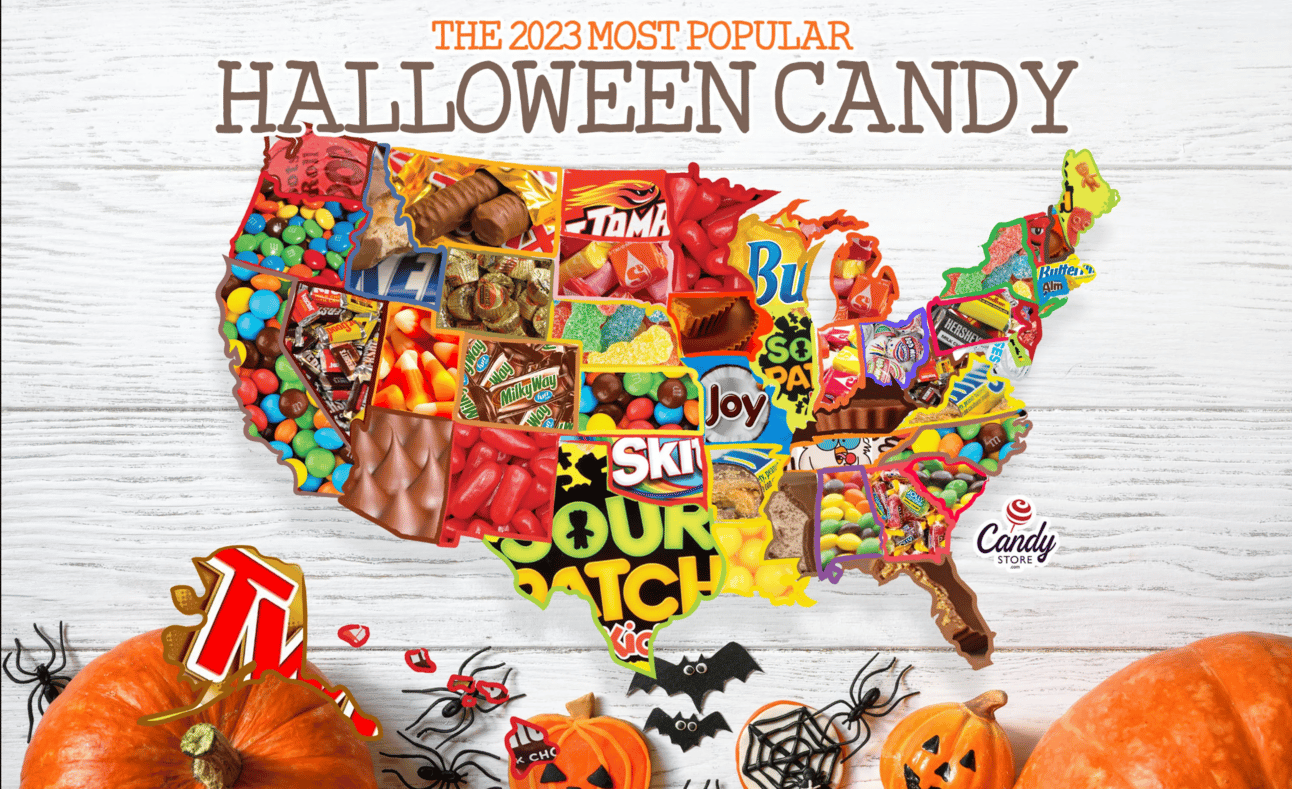
Image source: Candystore.com
📱Trending With Gen-Z
What social media is telling us about Gen-Z’s cravings! Can be enjoyed during an 🛗 ride.
Gen Z and Millennial consumers want mooncakes that fit their dietary lifestyles. Low-sugar, low-fat, vegan, preservative-free – these are a few of their favorite things! 🥮🎑
The Mid-Autumn Festival celebrated across much of Asia last week continued to see these on-trend interpretations of the beloved and revered traditional pastry. Local players across the region have been responding to these demands with innovative offerings. They’ve also been catering to these dietary demands from around the world.
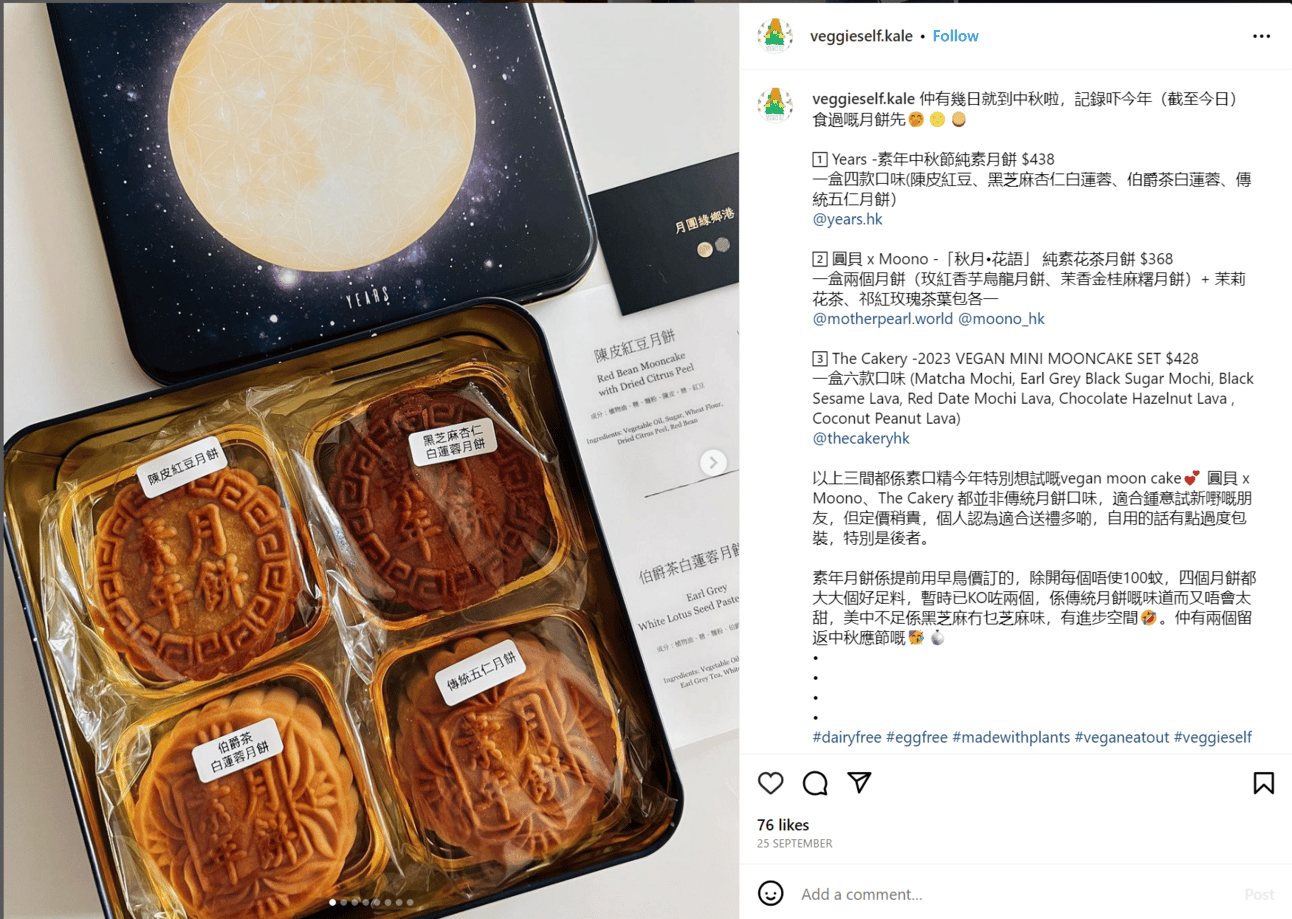
Source: Instagram
Join Us at AFTEA 2023!
GourmetPro is thrilled to be the official media partner for the Agri-Food Tech Expo Asia (AFTEA 2023). This event promises cutting-edge insights into the food-tech world, and we'll be right there capturing all the action.
Swing by in Singapore from Oct 31st to Nov 2nd and let's reconnect. We're eager to engage with each client and partner in attendance.

🚀 Innovation Deep Dive: Creating Opportunity Spaces Within Personalized Nutrition
Weekly deep dive into an F&B trend. Can be read in less than a 🚋 ride.
In 2022, the global functional foods market was worth a whopping USD304.2 billion, according to the good folks at Grand View Research. And you know what? This market is going to skyrocket to USD586.1 billion by 2030. 🚀
In fact, we’re already seeing a smorgasbord of application areas, ingredients, and formats sprouting up to cater to all sorts of consumer needs.
And speaking of catering, personalized nutrition is a fresh area of research that takes your run-of-the-mill nutrition advice and customizes it based on your genetics, medical history, lifestyle, and other nifty factors. 🧬🍏
Grab a snack, folks, and settle in for an interesting and insightful ride with Raphaëlle O’Connor into the world of wellness! 😇🍉

Raphaëlle O’Connor, founder of inewtrition
GourmetPro (GP): How have you seen the functional foods sector evolve over the last few years, especially in light of how there's been a rise in interest in health and wellness?
Raphaëlle O'Connor: Over the last couple of years, functional foods and beverages have certainly generated quite a lot of interest. COVID-19 was probably a good prompt for people to realize how health and wellness through nutrition was going to help them – in the short term and in the long term.
COVID has brought a lot of awareness and people are now looking for functional foods and beverages because they have understood their benefits, but they want the products at a price they can afford.
Unfortunately, we live in a world where health and wellness through nutrition is very polarized and only the few who have the budget and the education can fully identify or understand the value of functional foods and beverages. For a long time, this was an extremely elite type of communication. Over the last couple of years, inflation has also added pressure to price point and positioning.
Essentially, functional food and drink is no longer a privilege. This is a right and people expect brands and companies to offer functional foods and beverages at a more affordable price point.
GP: What are some of the major factors to consider for innovation within functional food and drink today?
Raphaëlle: Affordability has to be on the list of features of all the R&D and innovation teams. We don't necessarily need the bells and whistles to engage in the category of functional foods and beverages. There is a lot of fine-tuning that we can do with commodity ingredients and commodity products to engage with mass customers who are also looking for solutions in health and wellness through functional food and nutrition that they can afford.
The next critical factor that I have identified is what I call modulated and smart nutrition. There are a lot of innovation opportunities to break down the impact functional foods and beverages have, especially around contextual consumption. This means that we really need to look at the usage occasion or what context people use functional foods and beverages.
New sensory experiences like texture, color, mouthfeel, bite, packaging, and aroma are critical and there are a lot of opportunities in this space.
In terms of packaging, there are a lot of opportunities to innovate for convenience, in terms of the distribution channel or route to market. This is also where modulated nutrition and contextual consumption are critical.
The other kind of opportunity in this space is shaped by concerns around sugar reduction. So between flavor experiences, new sensory experiences, addressing new solutions around sweetness, these are key drivers for innovation.
We also really need to understand our target audience at a very emotional and intimate level. The lifestyle that people have is likely to drive how they engage with functional food and drink.
GP: Personalization has become a very important feature of food and drink for consumers today. How do nutrition and functional foods fit into this trend?
Raphaëlle: There is a lot of polarization of the food industry today.
On the one hand, consumers are looking for more value in the products that they buy. On the other hand, we are looking at people who are willing to pay a premium for highly functional foods that are going to be used for preventative health. Since consumers now have a real sense of how their diet is going to impact them in the long term, we are entering a kind of overlap among food, pharma and wellness.
We’re also seeing a lot of fragmentation through life stages, spanning age, lifestyle, and diet. For example, children, toddlers, students, and seniors have different nutritional requirements. If you go to the gym five times a week, your needs are going to be different from someone who is housebound with challenges to move around. This type of fragmentation creates very dynamic opportunities for innovation.
And this is where I can see personalized nutrition becoming well-established.
Personalization can be based on specific, but common, needs. Consumers have needs that they want to address and they expect food or dietary supplements to be tailored to these needs.
Lifestyle
Gen Z, Millennials have really busy lifestyles. They go through an awful lot of different kinds of experiences throughout their day, from waking up, to breakfast, to potentially going to the gym, then to work. For them personalization may be in terms of peak performance.
For example, a functional beverage to take before a workout and then another drink to recover after the workout. At both points, the consumer is in different states – whether it is mood or heart rate or other factors.
Format
Consider the category of dietary supplements. This is more for what we call the preventative proactive health consumer. This category is no longer expected to be nutritious as such. Instead, it addressed very specific health conditions, such as gut health with probiotics or DHA for mental health. Consumers can access well-established types of products to address a specific health condition before a condition becomes severe. There are over-the-counter offerings that have been prescribed by a consultant or products that might be recommended by a nutritionist or a dietitian.
Time
Time is actually a very interesting variable in personalized nutrition and influences the choice of product for different consumer groups in conjunction with needs and formats.
Peak performers, mostly younger consumers, are looking for that quick fix. It has to be within a couple of hours, sometimes a couple of minutes. They want it, and they want it now. That's personalization.
Proactive health consumers are the ones that are really investing in long-term health and wellness. Like the 50-year-old woman going through hormonal changes, but is still very active and health conscious. She wants to be at her peak all day and then she wants to have a good night’s sleep. So such consumers are looking more at dietary supplements. They are aware that there is something coming, but rely on dietary supplements to address it beforehand over a couple of months or a couple of years.
Reactive health consumers are the ones that have been potentially diagnosed with a specific condition and they're the ones who are going to look for a solution through nutrition in the medium-term, within a couple of weeks or a couple of months. They are also relying on prescribed medicine to address their condition. But they really need to address it but they’re closer to your medical profession here because they are going to look for a solution on personalized nutrition.
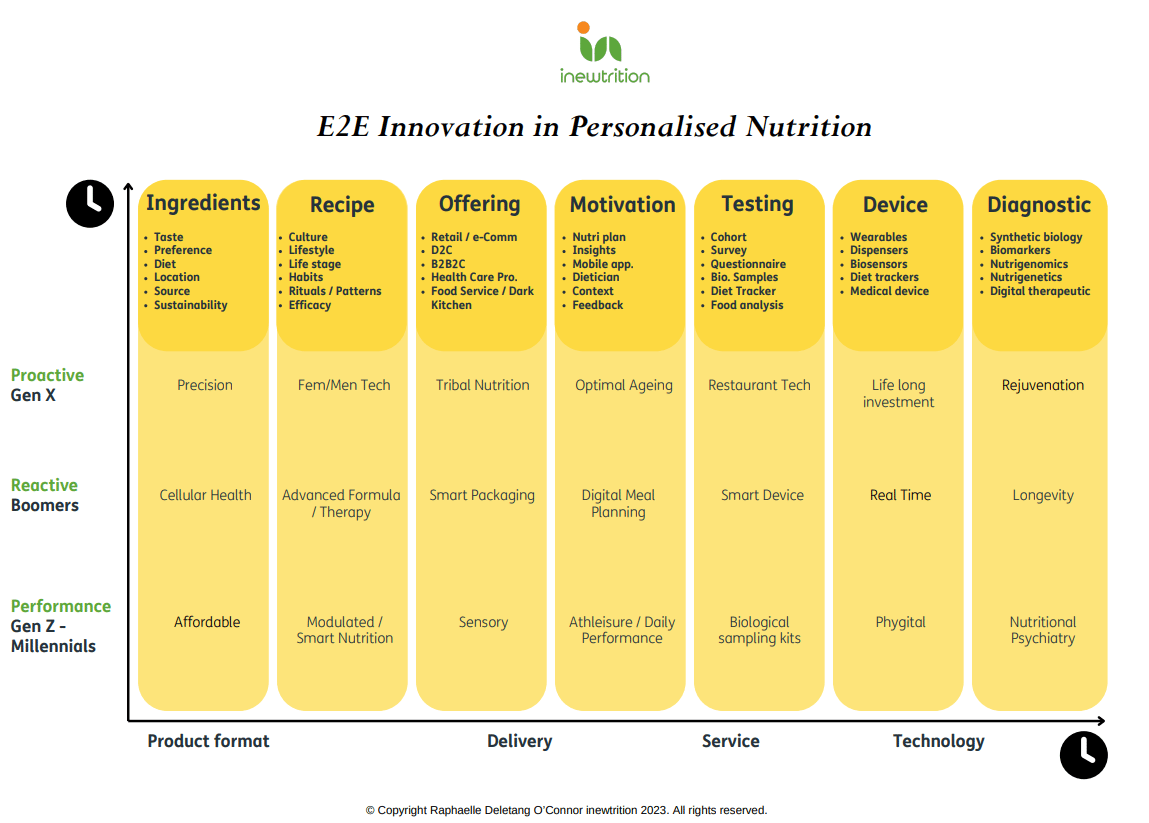
Image source: Raphaëlle O'Connor
Like what you’re reading?
GP: Personalized functional food and drink is not necessarily like medical products. How do you prove the efficacy of such products then?
Raphaëlle: You don't always need to reinvent the wheel here. Everybody knows that low sugar, high fiber, high protein, and vitamins and minerals are critical for health and wellness. You can use the science already available to create a good offering. This also helps with affordability.
But when creating personalized functional food and drink, building the evidence and science is critical and relevant across all categories. Data comes into play very early on. Data science is a very critical aspect of personalized nutrition, along with life science and social science, and has to be at the core of product innovation.
You have data about your ingredients and their nutritional profile. Each of the ingredients is going to drive the functional profile of the finished product to some extent.
You have data from your supplier and you also generate data from your own testing and development activity. This is critical to making progress.
Data around routes to market, distribution channels, supply chain, and logistics helps map out what's happening from the ingredient to the manufacturer to the consumer and how all of those move around, in terms of time and cost.
We also look carefully at data that takes into account storage, traceability, and sustainability.
Data also comes into play around the motivation for consuming personalized nutrition products. We are no longer talking about a transactional relationship between our manufacturer, our product, and our consumer. We are looking at the creation of shared value.
Brands and manufacturers benefit from getting data about their consumer so that they can refine or adjust their product or solution to align with the consumer expectation. This in turn helps the consumer meet their objectives in terms of health, wellness, and nutrition.
The consumer is leaning on the brand to have access to data and information to progress in the right direction with their goals.
Creating interfaces between the brand and the consumer to exchange that data – through memberships, different subscription models, mobile and technology applications – can build customer loyalty.
The next aspect where data is critical is testing. The question here is around the quality of the data, the analysis of the data, and also the continuous improvement of the algorithm or tools that are used to correlate nutrients, diet, behavior, and test results.
With the ultimate objective that has been fixed in terms of health and wellness, devices can also be critical because they support the testing and monitoring of data. At the same time, we need to take into account ethics around safety and privacy concerns.
The last piece here is around diagnostics. We have a lot of new sciences coming out nutrigenomics, transcriptomics, metabolomics, microbiomics, and genomics. All of those also generate a lot of data, which is the easy part.
But what you do with that data and its quality is very difficult. Connecting all of those isolated aspects of personalized nutrition in a way that helps build the evidence, the science of the interconnection, and the dependency between diet and health and wellness is very complex. Advanced analytics, machine learning, and artificial intelligence can be very useful here to combine or connect the ingredients and the impact it has.
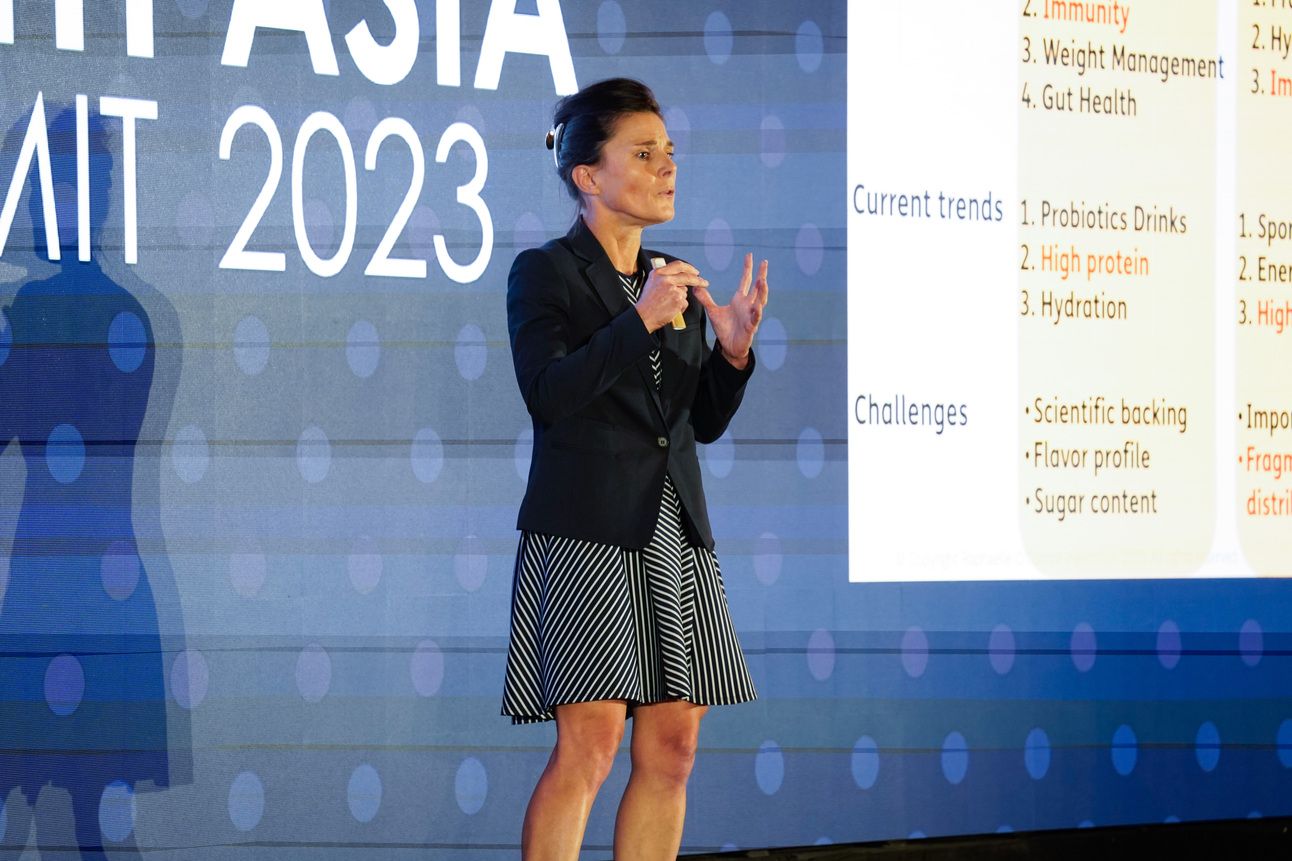
Raphaëlle at the Growth Asia Summit 2023 in Singapore in September
GP: One of the challenges for consumers is that they have so much information at hand, but not necessarily the right kind of information or there's a lot of misunderstanding about functionality and effectiveness of foods and nutrition. How do you then help consumers understand this?
Raphaëlle: It is a given now that we have to demonstrate the value and the science and the benefit of personalized nutrition. There are some consumers who have educated themselves; they usually know exactly what's right and what's wrong.
But increasingly now, you have consumers who know how the product should perform, but they don't necessarily care about the science. Consumers are quite happy to delegate all that work to a brand they can trust. These consumers just want to experience, they want to be enlightened, they want to discover. And that puts back the accountability and the responsibility on the brand.
So, we are really in this codependent and intimate relationship between the brand and the consumer where we are supporting each other along the way.
From a brand and manufacturer perspective, they need to build that knowledge. They need to understand the pain points of the consumer. They need to get the data, build that trust and that loyalty.
From the consumer perspective, they are willing to give knowledge and data about themselves. They are opening themselves up and giving up some of their privacy. In return, consumers are expecting to get results and see some evidence. They are expecting to get the full service and support to address those conditions.
A very interesting point is how conflicting some of those messages and expectations are. And how much dichotomy there is in personalized nutrition. I have identified three different aspects that I think are very difficult to address, but are very important to consider in terms of communicating in this space.
The first one is that consumers want products that are natural, sustainable, traditional but at the same time they want all of the bells and whistles around technology. They want all the best features in terms of convenience and how that fits into their lifestyle. These are not exactly going in the same direction.
The second aspect is that consumers want all of these to be available at home, but they expect industry standards. So how do brands go to that level of intimacy and efficacy and support their consumer?
The third aspect I have identified is how consumers want a very personalized offering, everything has to be bespoke just for them. But food is also very sociable and very tribal. People don’t want to isolate themselves, so it's very important to have a bespoke offering but also ensure that the consumers still have a feeling of belonging.
This boils down to consumers having three main areas of interest. First is control, second is belonging, and third is purpose. And personalized nutrition needs to touch on all three aspects, in terms of product development and messaging.
Want to leverage Raphaëlle’s expertise for your own product innovation?
That’s all folks
Thanks for reading today’s newsletter.
Share your ideas for how we can improve with this 30-second, anonymous, 2-question survey:
See you in two weeks as we explore one of the hottest health claims for F&B launches.
About Us: GourmetPro is a global network of elite food and beverage industry talents. We provide fractional hiring solutions, allowing international managing directors to scale and transform their local resources and teams with high flexibility and expertise in more than 30 countries. Explore our services.
Made with ❤️ by GourmetPro - your network of Food & Beverage experts, on demand.
💌 If you have any questions, you can directly answer this email. We read and answer all messages.
💖 And if you think someone you know might be interested in this edition of Market Shake, feel free to simply forward this email or click the button below. 💖


